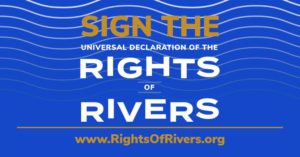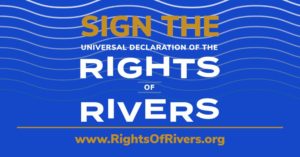Compartimos nota de prensa publicada en el Chiapas Paralelo el día de hoy. Seguimos en la campaña de recolección de firmas para adherirse a la Declaración por los Derechos de los Ríos y los Pueblos, para sumarse puede entrar en estos links:

 Español https://chng.it/ngV7CMrSWx
Español https://chng.it/ngV7CMrSWx
 Portugés https://chng.it/scNNkdxp6V
Portugés https://chng.it/scNNkdxp6V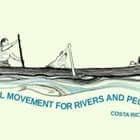
 Inglés https://chng.it/fzpxz4wp
Inglés https://chng.it/fzpxz4wpPueblos piden transición energética justa y respetuosa alejado de las corporaciones
Chiapas Paralelo

- Por Redacción Yessica Morales
- 8 septiembre, 2021
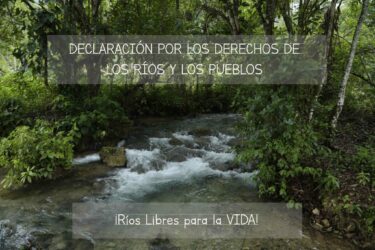
Declaración por los Derechos de los Ríos y los Pueblos. Cortesía: Otros Mundos A. C.
*Enfatizaron que, no hay evidencia científica de la supuesta condición “sostenible” de las represas.
*La Red Latinoamericana de Afectadas/os por las Represas y en Defensa de los Ríos, sus Comunidades y el Agua, invitaron a los pueblos, movimientos y organizaciones sociales defensoras de la vida a sumarse a la “Movida global por los ríos y los pueblos”.
Movimientos, colectivos y organizaciones* en la defensa de ríos y pueblos, declararon en el marco del Congreso Mundial de Energía Hidroeléctrica realizado por la Asociación Internacional de Energía Hidroeléctrica (IHA) que, gobiernos y empresas buscan fortalecer sus inversiones nacionales y transnacionales a través de la hidroelectricidad, argumentan que es energía “verde, sustentable, limpia y socialmente responsable”.
Señalaron que, las hidroeléctricas provocan deforestación, alteración irreparable de los ecosistemas de los ríos, muerte de la fauna incluidos los peces, que son alimento para los pueblos, pérdida de biodiversidad, manglares y acuíferos, como la explotación indiscriminada, mercantilización y privatización del agua.
Aunado a ello, el desplazamiento forzado y violento de muchos pueblos del mundo que se quedaron sin agua para tomar, pescar y cultivar, además sus culturas y tejido social son destruidos.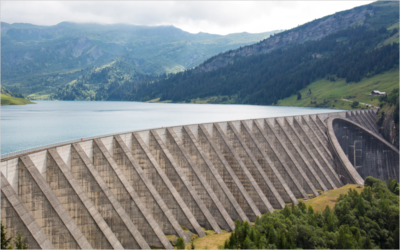
Un informe de la IEA indica que la energía hidráulica tiene un papel clave en la consecución de los objetivos climáticos para 2050. Cortesía: Smart Grid
Las y los defensores indicaron que, muchas de las víctimas son los pueblos indígenas originarios, cuyos ríos y territorios son un botín para las corporaciones, asimismo, las represas provocan persecución, intimidación y asesinatos, como es el caso de Berta Cáceres, ocurrido el 02 de marzo de 2016 en Honduras.
Las represas también desatan una galopante corrupción y tráfico de influencias, que en muchos casos terminan en conflictos internacionales, expusieron los movimientos, colectivos y organizaciones.
Añadieron que la tecnología de las represas no favorece a la naturaleza, ni genera bienestar humano, pues su aporte al calentamiento global es indudable, ya que se basan en un modelo extractivo y de explotación ilimitada en los ecosistemas, esto acentúa las sequías e inundaciones, poniendo a millones de personas en riesgo permanente.
Por ello, desde los pueblos llamaron a una transición energética justa y respetuosa, que revise las condiciones e impactos de cada una de las tecnologías y tenga como prioridad el respeto de los derechos de la gente y los ríos.
Ninguna fuente energética será sustentable mientras se destruya la Madre Tierra, se privaticen los bienes comunes y se concentre la riqueza despojando a los pueblos, acaparando gigantescos territorios y violentando los derechos de la naturaleza, y en especial los derechos de los ríos, indicaron los movimientos, colectivos y organizaciones.
Movida Global por los Ríos y Pueblos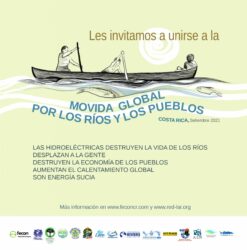
Invitación a los y las defensoras de los ríos del planeta a la Movida Global Por los Ríos y Pueblos. Cortesía: REDLAR
La Red Latinoamericana contra Represas y por los Ríos, sus Comunidades y el Agua (REDLAR) invitó a las y los defensoras de los ríos del planeta a la Movida Global por los Ríos y Pueblos, debido a que la IHA, organizó el Congreso Mundial de Energía Hidroeléctrica.
Dicho evento se realizará del 7 al 24 de septiembre de 2021, en Costa Rica, país exhibido como ejemplo exitoso de energía “limpia y sostenible”, idea que se repite en su proyecto de Declaración de San José.
En respuesta al Congreso de la IHA, organizaciones en Costa Rica en coordinación con movimientos socioambientales y ecologistas de todos los continentes llevaran a cabo el Movimiento Global con el objetivo de crear un espacio alternativo de discusión y movilización en defensa de los ríos y los pueblos del planeta.
REDLAR señaló que, el Movimiento Global incluye las siguientes acciones para antes y después del Congreso: cada país generará un “Pronunciamiento nacional” ante las hidroeléctricas, estos serán reunidos en un compendio que compartirán con todos y todas.
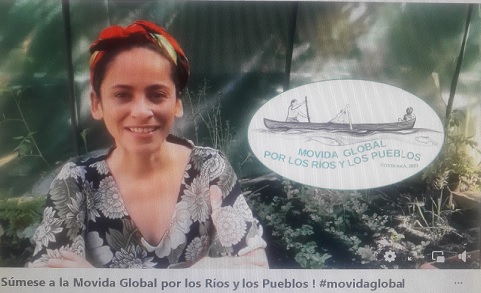
Con base en la “Declaración Ríos Saludables para una Recuperación Justa y Verde”, esperan opiniones sobre: una moratoria global de nuevas hidroeléctricas, aumento de la inversión en energías renovables y almacenamiento de energía, nueva matriz energética y generación distribuida de manera democrática, y salvaguarda de áreas vulnerables y reconocimiento jurídico de derechos de los ríos.
Asimismo, la Red pidió a las y los participantes compartir su experiencia ante las hidroeléctricas en foros virtuales Inter países, también pueden hacer su pronunciamiento en audios y videos.
IHA viola los Derechos de los Ríos
Realizaron una acción pacífica en el pinteo de postes y muros para rechazar la construcción de más represas en Chiapas. Cortesía: Abejas de Acteal.
Otros Mundos A. C. y Amigos de la Tierra México dieron a conocer que, millones de personas en el mundo han sido despojados de sus viviendas y medios de vida por la construcción de las represas.
Al mismo tiempo, mencionaron que defensoras y defensores de los ríos, comunidades, agua, y ecosistemas, les ha arrebatado la vida en busca del supuesto desarrollo que conlleva la devastación, inundaciones, apropiación de territorios indígenas y campesinos, pérdida de bosques y biodiversidad.
Pese a todo ello, la IHA convocó al Congreso Mundial de Energía Hidroeléctrica, donde pretende consolidar el discurso y políticas que favorezca la construcción de más represas, un negocio lleno de corrupción, bajo el argumento de que las represas son energía limpia, verde, sustentable, ecológica y con empresas constructoras “socialmente responsables”.
Sin embargo, indicaron que el agua de los ríos como fuente renovable no se hace sustentable con la tecnología del modelo extractivo que se le impone, en la actualidad las represas y su fuente de energía cada vez más intermitentes por el calentamiento global, son insustentables.
Los pueblos levantan su voz para manifestarse contra este modelo extractivo que viola los Derechos de la Naturaleza y en especial los Derechos de los Ríos, y evitar que sean intervenidos con el fin de mantenerlos vivos para darle vida al planeta, dijo Otros Mundos A. C. y Amigos de la Tierra México.
Es así como se suman a la llamada “Movida Global por los Ríos y los Pueblos” para exigir un alto a la construcción de las represas, muerte de los ríos y del planeta, e impulsar otras formas de vida con modelos de energías desde los pueblos, donde los Derechos de los Ríos y a la Vida están por encima de los intereses particulares y de lucro de las grandes corporaciones constructoras de represas.
*Movimientos, colectivos y organizaciones:
-Red Latinoamericana de Afectadas/os por las Represas y en Defensa de los Ríos, sus Comunidades y el Agua
-Federación Ecologista Costarricense
-Otros Mundos Chiapas
-Asociación Proyectos alternativos
-Amigos de la Tierra Costa Rica Ríos Libres-Costa Rica
-Ríos libres Turrialba-Costa Rica
-Mesa provincial Misiones-Argentina
-Grupo ecologista Cuña Pirú

